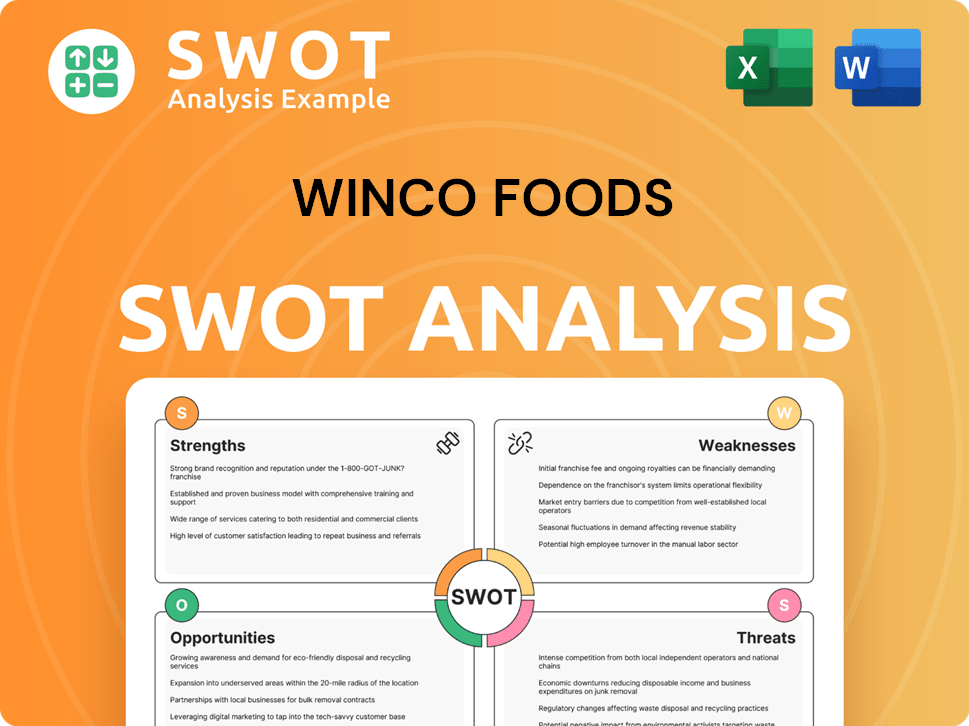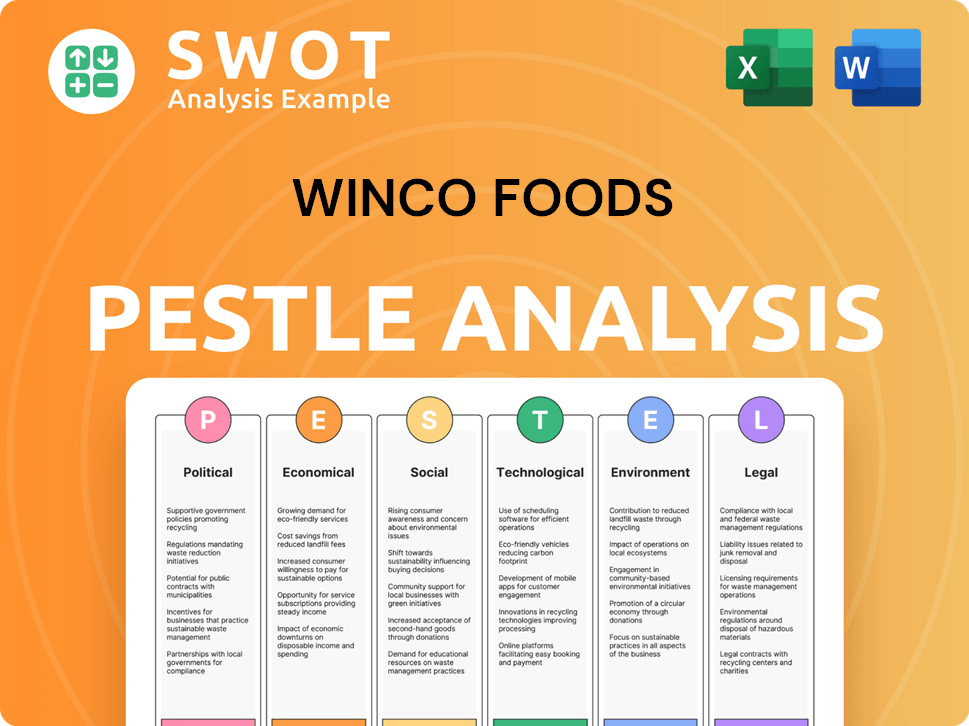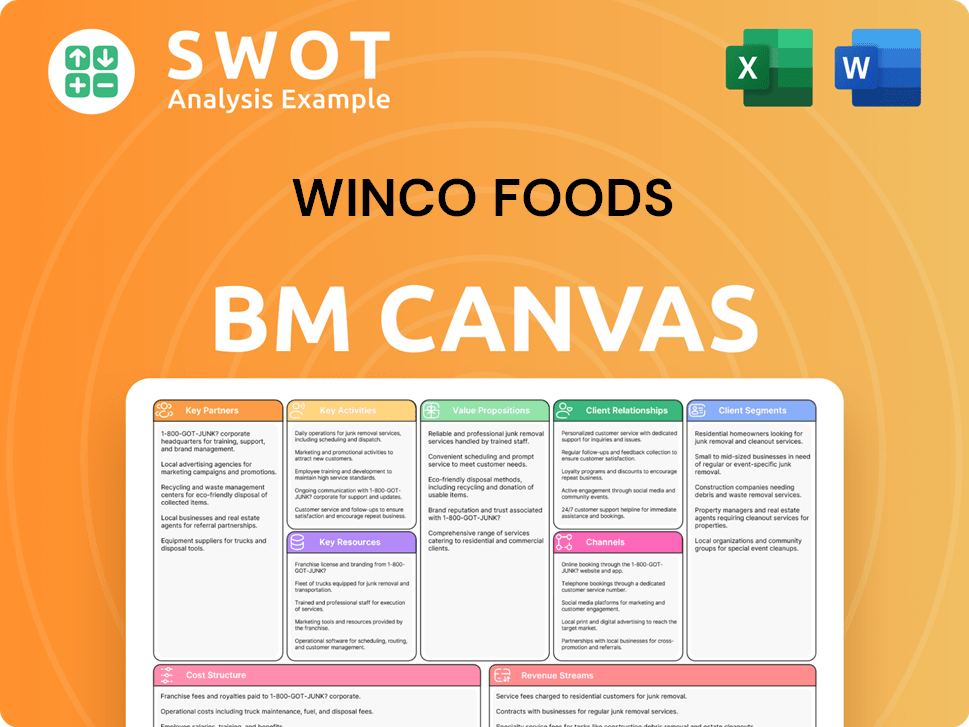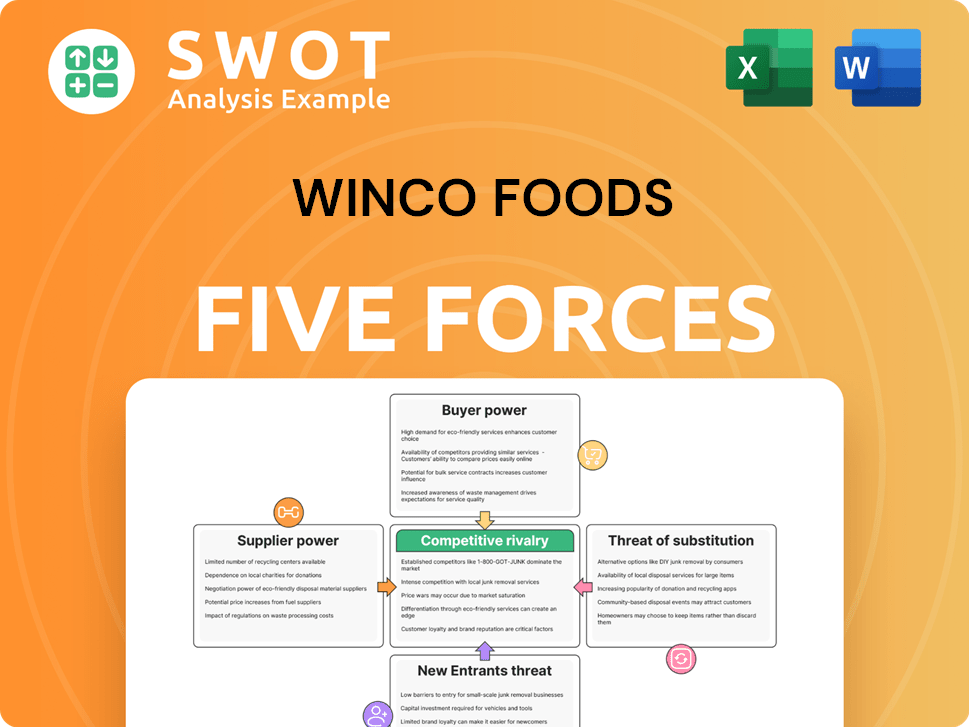WinCo Foods Bundle
Who Really Owns WinCo Foods?
Understanding a company's ownership is key to grasping its strategy and values. WinCo Foods, a grocery chain known for its low prices, operates under a unique model. Delving into WinCo Foods SWOT Analysis can illuminate how its ownership impacts its market approach. This exploration will uncover the essence of WinCo's structure and its implications.

The story of WinCo Foods, from its humble beginnings in 1967 as Waremart to its current status, is a testament to its innovative approach. This deep dive into WinCo ownership reveals its evolution, from its founding to its current employee-owned structure. Discover how this unique model influences its operations, its expansion plans, and its commitment to its employees and customers, setting it apart from its competitors.
Who Founded WinCo Foods?
The story of WinCo Foods begins in 1967, with the vision of Ralph Ward and Bud Williams. They launched the company in Boise, Idaho, initially calling it Waremart. Their combined expertise in the grocery sector laid the groundwork for a unique approach to the business.
The early ownership structure of WinCo Foods, between Ward and Williams, centered on a no-frills, warehouse-style grocery model. This approach emphasized efficiency and cost savings, which became fundamental to their business strategy. This operational focus helped shape the early distribution of control, setting the stage for its later employee ownership model. There is no publicly available information about the exact equity split at the company's inception.
Early financial commitments and operational frameworks were crucial in those initial stages. While details of early investors or disputes are not available, the founders' vision for a low-cost grocery alternative was clear from the start. The company's focus on efficiency and employee ownership has been a key part of its identity.
WinCo Foods was founded in 1967.
Ralph Ward and Bud Williams founded the company.
Initially, the company was called Waremart.
The first store opened in Boise, Idaho.
The company focused on a no-frills, warehouse-style grocery model.
The early ownership structure was shaped by the founders' vision.
The founders' experience in the grocery industry was instrumental in shaping the company's focus on efficiency and cost savings. This approach, which is still a key part of the company's strategy, is discussed in more detail in the article Growth Strategy of WinCo Foods. WinCo Foods remains a privately held, employee-owned company, a structure that has been central to its operational model since its early days. The company has expanded significantly since its founding, with a store count that continues to grow. While specific financial details of the early ownership are not publicly available, the founders' vision has clearly guided the company's development.
WinCo Foods SWOT Analysis
- Complete SWOT Breakdown
- Fully Customizable
- Editable in Excel & Word
- Professional Formatting
- Investor-Ready Format

How Has WinCo Foods’s Ownership Changed Over Time?
The evolution of WinCo Foods' ownership is a significant aspect of its business model. The most defining moment in WinCo's ownership structure was its shift to an employee-owned company. This journey commenced in 1985 with the establishment of an Employee Stock Ownership Plan (ESOP).
Over time, the ESOP progressively acquired more shares, eventually leading WinCo to become entirely employee-owned. This structure means that current and retired employees, through the ESOP, are the principal owners of the company. This contrasts with publicly traded companies, which typically have diverse institutional investors or private equity firms.
| Aspect | Details | Impact |
|---|---|---|
| Ownership Structure | Employee Stock Ownership Plan (ESOP) | Ensures employees have a direct stake in the company's success. |
| Key Stakeholders | Current and retired employees | Aligns employee interests with company profitability. |
| External Influence | No external venture capital or private equity | Maintains focus on long-term growth and employee benefits. |
This employee-ownership model has profoundly influenced WinCo's strategy and governance. It cultivates a culture where employees have a direct interest in the company's profitability and success. This structure is often cited as a key factor in its consistent growth and ability to compete effectively against larger grocery chains. The fact that WinCo Foods is employee-owned, distinguishes it from many of its competitors and contributes to its unique business approach. For more insights, you can explore the WinCo Foods employee-owned grocery chain.
WinCo Foods is entirely employee-owned, a structure that began with an ESOP in 1985.
- The ESOP gradually increased its shareholdings, leading to full employee ownership.
- This model fosters a culture where employees have a vested interest in the company's success.
- The absence of external shareholders allows WinCo to focus on long-term goals and employee benefits.
- This unique structure is a key factor in WinCo's ability to compete effectively.
WinCo Foods PESTLE Analysis
- Covers All 6 PESTLE Categories
- No Research Needed – Save Hours of Work
- Built by Experts, Trusted by Consultants
- Instant Download, Ready to Use
- 100% Editable, Fully Customizable

Who Sits on WinCo Foods’s Board?
The Board of Directors at WinCo Foods is pivotal in steering the employee-owned company. While specific details about each board member are not publicly available, the board is composed of individuals who oversee the company's strategic direction and financial health, acting in the best interest of the employee-owners. The board's structure reflects WinCo's unique ownership model, where employees are the primary stakeholders.
The board's responsibilities include ensuring the company's long-term sustainability and adherence to its employee-ownership principles. The composition and activities of the board are designed to support the company's mission and values, focusing on the collective interests of the employee-owners. The board's decisions are geared towards maintaining WinCo's competitive edge and fostering a positive work environment for its employees. The Marketing Strategy of WinCo Foods reflects the company's values.
| Aspect | Details | Relevance |
|---|---|---|
| Board Composition | Composed of individuals overseeing strategic direction and financial health. | Ensures employee-owner interests are prioritized. |
| Decision-Making | Shaped by the collective interests of the employee-owners. | Maintains the company's employee-owned structure. |
| Public Information | Specific details about board members are not publicly disclosed. | Reflects WinCo's private, employee-owned status. |
The voting structure at WinCo is intrinsically linked to its Employee Stock Ownership Plan (ESOP). Employees acquire shares through the ESOP, and their ownership typically translates into voting rights. The specifics of how these votes are exercised are governed by the ESOP's trust documents. Given its private and employee-owned nature, WinCo Foods typically does not experience proxy battles or public governance controversies. The company's focus remains on its employee-owners, guided by the Board of Directors.
WinCo Foods is an employee-owned company, which influences its governance and operational strategies. The Board of Directors is responsible for overseeing the company's direction and financial health. The voting power is primarily held by the employees through the ESOP.
- The board is dedicated to the interests of employee-owners.
- Decision-making is driven by the collective interests of the employees.
- The ESOP structure is central to the company's voting mechanism.
- WinCo Foods is a private company.
WinCo Foods Business Model Canvas
- Complete 9-Block Business Model Canvas
- Effortlessly Communicate Your Business Strategy
- Investor-Ready BMC Format
- 100% Editable and Customizable
- Clear and Structured Layout

What Recent Changes Have Shaped WinCo Foods’s Ownership Landscape?
Over the past 3-5 years, the ownership structure of WinCo Foods has remained consistent, primarily due to its employee-owned model. This structure means that traditional corporate actions, such as significant share buybacks or public offerings, are not applicable. The company’s growth strategy has centered on organic expansion, with new store openings in locations like Surprise, Arizona, and Billings, Montana, demonstrating its ongoing commitment to growth. This approach contrasts with strategies involving mergers or acquisitions that could alter its ownership profile.
Leadership transitions within WinCo Foods, such as the 2024 appointment of Noah Wilcox as CEO, reflect internal advancements rather than shifts influenced by external ownership interests. The company's employee-owned model inherently shields it from external pressures often associated with publicly listed companies, such as the influence of activist investors. Because of its unique structure, industry trends like increased institutional ownership have no direct impact on WinCo. The focus of WinCo remains on sustainable growth and profitability for the benefit of its employee-owners, without any public statements about future ownership changes.
| Aspect | Details | Recent Activity |
|---|---|---|
| Ownership Structure | Employee-owned (ESOP) | No changes in ownership type |
| Growth Strategy | Organic expansion | New store openings in 2023 and 2024 |
| Leadership | Internal promotions | Noah Wilcox appointed CEO in 2024 |
WinCo Foods continues to operate under its established employee-owned model. This unique structure has allowed the company to focus on sustainable growth and internal leadership transitions. For more information about the competitive environment, you can read about the Competitors Landscape of WinCo Foods.
WinCo Foods is privately held and employee-owned. This structure influences all major decisions. The company's focus remains on sustainable growth and internal management.
WinCo has expanded its presence with new store openings. New stores were opened in 2023 and 2024. This expansion is part of their organic growth strategy.
WinCo Foods Porter's Five Forces Analysis
- Covers All 5 Competitive Forces in Detail
- Structured for Consultants, Students, and Founders
- 100% Editable in Microsoft Word & Excel
- Instant Digital Download – Use Immediately
- Compatible with Mac & PC – Fully Unlocked

Related Blogs
- What are Mission Vision & Core Values of WinCo Foods Company?
- What is Competitive Landscape of WinCo Foods Company?
- What is Growth Strategy and Future Prospects of WinCo Foods Company?
- How Does WinCo Foods Company Work?
- What is Sales and Marketing Strategy of WinCo Foods Company?
- What is Brief History of WinCo Foods Company?
- What is Customer Demographics and Target Market of WinCo Foods Company?
Disclaimer
All information, articles, and product details provided on this website are for general informational and educational purposes only. We do not claim any ownership over, nor do we intend to infringe upon, any trademarks, copyrights, logos, brand names, or other intellectual property mentioned or depicted on this site. Such intellectual property remains the property of its respective owners, and any references here are made solely for identification or informational purposes, without implying any affiliation, endorsement, or partnership.
We make no representations or warranties, express or implied, regarding the accuracy, completeness, or suitability of any content or products presented. Nothing on this website should be construed as legal, tax, investment, financial, medical, or other professional advice. In addition, no part of this site—including articles or product references—constitutes a solicitation, recommendation, endorsement, advertisement, or offer to buy or sell any securities, franchises, or other financial instruments, particularly in jurisdictions where such activity would be unlawful.
All content is of a general nature and may not address the specific circumstances of any individual or entity. It is not a substitute for professional advice or services. Any actions you take based on the information provided here are strictly at your own risk. You accept full responsibility for any decisions or outcomes arising from your use of this website and agree to release us from any liability in connection with your use of, or reliance upon, the content or products found herein.